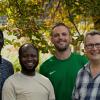
IIASA Cooperation and Transformative Governance Research Group Leader, Nadejda Komendantova, has been appointed as an international expert for the UK Research and Innovation (UKRI)/Natural Environment Research Council (NERC)’s Constructing a Digital Environment Program.
 © Silveri | IIASA
© Silveri | IIASA
The UKRI/NERC Constructing a Digital Environment Program is an exciting challenge set to develop, for the first time, the thinking and practice around a digitally enabled environment, providing benefits for policymakers, businesses, communities, and individuals. The focus of the program is the combination of environmental science, with computer science, data science, and behavioral science.
Key to the program is the appointment of an expert network of leading influencer-practitioners, thought-leaders, and scientific and technical authorities, whose work will identify best practices in the digital environment and help influence UK environmental policy thinking, drawing on expertise in the methodologies and tools for assessing, analyzing, monitoring, and forecasting the state of the natural environment.
The relationship between UKRI and IIASA stretches back to 2015 when the UK first joined IIASA. Together with NERC, the institute also offers fellowships to support talented early career researchers in delivering challenging research and supporting collaboration between the two organizations.
Under the leadership of Komendantova, the Cooperation and Transformative Governance Research Group within the Advancing Systems Analysis Program deals with systems-level transformations and key transitions for societal resilience and sustainable systems through an enhanced understanding of, and the ability to manage, existing challenges, including social dilemmas and wicked problems of public policy-planning. The digitalization of markets, society, and government is a key research area of the group, which makes Komendantova ideally suited for the consultative role she will provide for the program.
“The rapid spread of digital technologies over the past decades has led to a vast transformation in economic activities globally. Digital transformation is creating new cross-industry, interconnected ecosystems, which bring new opportunities, new networks, partnerships, and communities. It can however, also create challenges such as increased exposure to information infrastructure breakdown or cyberattacks. Digitalization drastically increases interconnectivity and therefore policies on digital transition require a holistic vision,” says Komendantova. “In this role, I am happy to contribute with the methodology of systems analysis and the identification of new challenges and further areas of research on digital transformation. I think that systems thinking can help to leverage opportunities, address the challenges of digital transformation, and provide a holistic and compromise-oriented view of various digital market stakeholders, including digital platform participants, governments, and regulators as well as social networks users”.
We congratulate Nadejda Komendantova on this important appointment and look forward to continued and fruitful collaboration with both UKRI and NERC in the future.
News

30 August 2023
The IIASA Summer Experience: A Blend of Learning and Experience in a nurturing atmosphere

26 June 2023
Are we building back better yet?

25 January 2023
